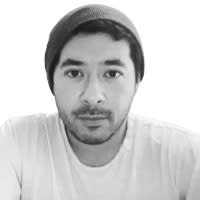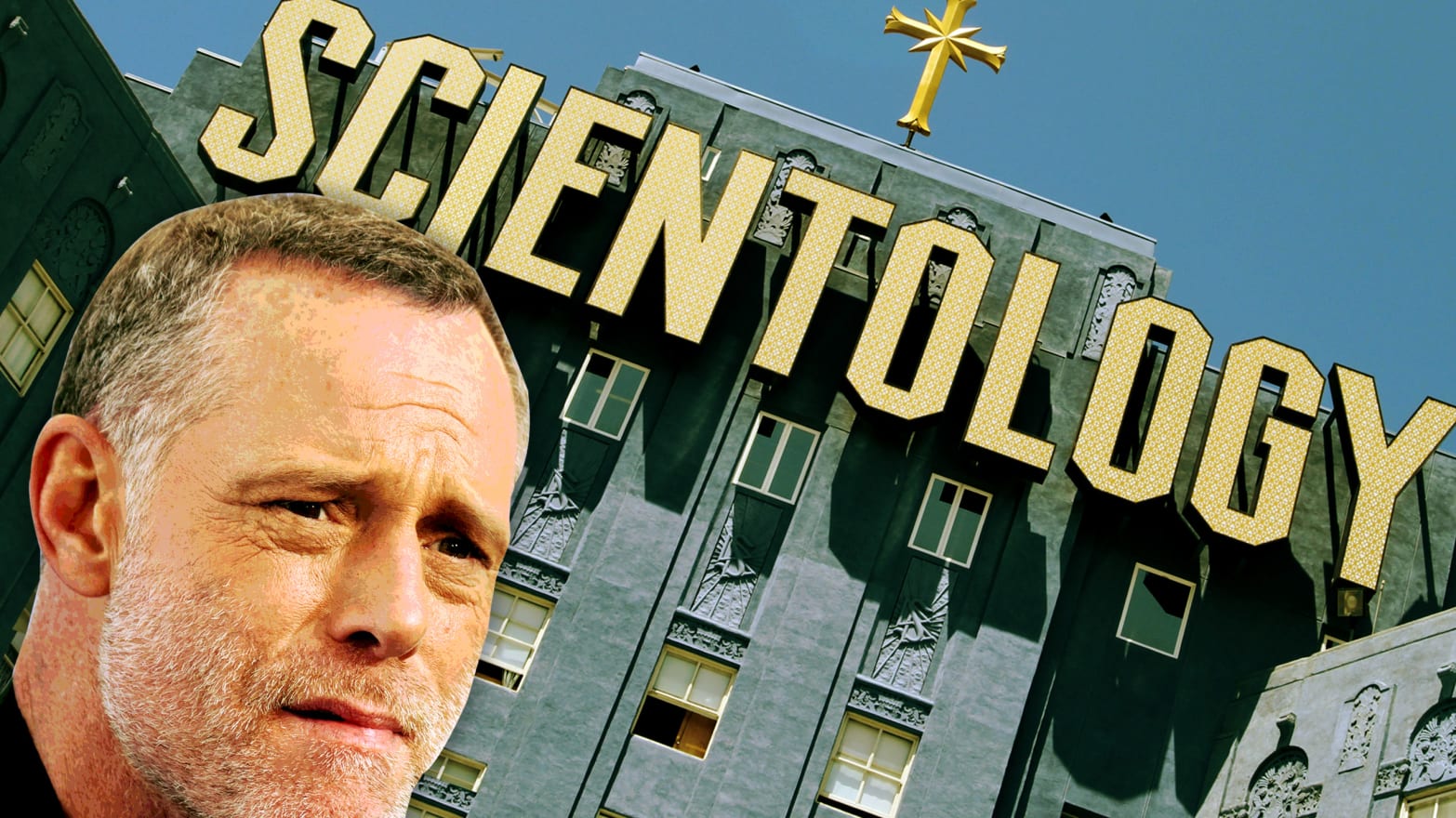As Chicago P.D.’s Hank Voight, he is a broken man haunted by his felonious past. The tragic loss of his wife to ovarian cancer and the brutal murder of his wayward son have further reduced him to a font of rage; a man armed with a badge, a gun, and a grudge against the world. He wears the pain in his voice, which sounds like a rusty gravel truck barreling down a dirt road.
“When puberty hit, I went down low and there was some gravel,” says Jason Beghe, who plays Officer Voight. “But I was in a very serious car accident in ’99—broke my neck, my back in a couple of places, all of my ribs, both of my lungs. I was in a coma for three and a half weeks. When I would come out of the coma, since I was intubated from being on life support, I would pull the tube out and it made it even more fucked up.”
He looks off in the distance and laughs. “It’s good for Voight—not so good when I have to play the sweet dad. But it’s good with my kids. They’re good kids, but when I say, Hey, it’s time to clean up, they do it.”
Beghe, 56, appears to be in a very good place now. The journeyman actor, who’s starred in films like Thelma & Louise and G.I. Jane and popped up on TV series ranging from Melrose Place to Everwood, is in his fourth season as the lead of Chicago P.D., the finest in procedural wizard Dick Wolf’s stable of Chicago-set shows.
We’re pulled up at a bar inside of the Lagunitas brewery in Chicago, where NBC is hosting a sprawling press day for their Chicago lineup, and Beghe is beaming. He recently had the pleasure of taking his kids to see the Chicago Cubs square off against the Cleveland Indians in the World Series, where the Cubs would eventually break a 108-year championship drought.
But his recent Cubs fandom aside—a product, he says, of filming his show in the Windy City—Beghe is a New Yorker through and through. He attended the Collegiate School, an elite private prep school for blue-blooded New York City boys, where his two best pals were John F. Kennedy, Jr. and David Duchovny.
“You have no idea the friends I had!” he boasts, smiling. “I used to hang out with Andy Warhol, Truman Capote. Harry Belafonte was my second father growing up. But I was very close with John. His mother took me to Europe my first time. The Secret Service would watch us, but they were great! We would joke around with them and they stayed out of the way. We could sneak out and smoke pot. They gave us our space.”
He even convinced JFK Jr. and Duchovny to pursue acting. As for his own career, Beghe first worked as a model in Europe before making his film debut in 1985’s Compromising Positions, alongside Susan Sarandon. Since then, he’s bounced around from TV show to TV show, making the occasional film appearance along the way.
“It’s funny,” he says. “I’m not a very ambitious guy and I don’t have goals, which makes me a pain in the ass to certain people in my life. But my favorite quote, as a person and as an artist, came from Picasso. Somebody asked him once how you plan a painting like Guernica, and he looked at him and said, ‘I paint the picture to find out what it looks like.’ I try to live my life like that—moment-to-moment. It keeps it exciting.”
This live in the moment approach has its downsides, too. In 1994, while taking an acting class taught by famed acting coach and Scientologist Milton Katselas, Beghe began studying Scientology. By the mid-2000s, he’d risen to the level of OT, or “Operating Thetan”—the “highest state” according to the controversial religion—and had given an estimated $1 million of his earnings to Scientology. He was featured in ads for the church, and sang its praises at Scientology events.
Then, in 2007, he left Scientology. The following April, he sat down for a two-hour interview in which he spoke out against the Church of Scientology, calling it “dangerous for your spiritual, psychological, mental, emotional health.” The video went viral, attracting millions of viewers worldwide, as well as condemnation from the church.
“I don’t really think about it much—which is good,” Beghe says of Scientology. “I went through some shit. One never knows how much of it is still influencing you, because you don’t know what you don’t know.”
I ask him if he has any regrets about donating $1 million of his money to what he claims is a toxic organization. “I don’t think about it. I make plenty of money now, and you look at my life now and maybe think, oh, he’s doing great, but there are always new sets of problems,” he offers. “There’s a case to be made that this success has a lot to do with that failure. It’s chiaroscuro. It’s light and dark. It’s the way it is. And sometimes the darker it is, that makes that light even more beautiful, and more important, and rare, and worth something. That’s part of my story. It’s who I was at that moment, and I’m sure it has something to do with who I am now.” Ever since defecting from the church, Beghe has—along with Leah Remini—become one of the foremost Scientology celebrity whistleblowers. He’s appeared at several protests and events speaking out against the religion, and famously featured in Alex Gibney’s Scientology docu-exposé Going Clear—the impact of which, he claims, has been significant.
“I don’t think it is business as usual. I think that place is suffering. I’m careful, because I don’t care what anybody believes, but I’m not into people hurting my people,” he says. “My problem with Scientology had to do with the superstructure of the organization—and [David] Miscavige is the superstructure of the organization. I’m not going to sit by and watch someone beat the shit out of some old lady; I’m going to do something about it. That’s who I am.”
Jamie DeWolf, the great-grandson of Scientology founder L. Ron Hubbard, once compared the practice to a “pyramid scheme” in which adherents pay large sums of money to enroll in courses and move up levels—only to be inundated with more and more expensive courses.“One of the things I realized when I was extricating myself is there are many, many steps when you’re in this thing, and then I realized, Holy shit, that’s a fucking cult. Wow! I was in a cult? I don’t strike me as someone who would be in a cult,” says Beghe.
“And then I realized, maybe it’s true maybe it’s not, but in my opinion—which is just an opinion—I don’t think there’s anybody that isn’t in a cult. Everybody’s in a cult. This country is a cult. I see the indoctrination going on from the get-go,” he continues. “I have children and I see them pledge allegiance to the flag, and they don’t know what they’re doing. They don’t know! You should be able to make that choice yourself. And then I’m buying this type of toothpaste because, well, it’s advertising. It’s bullshit. It helped me develop a mantra that I try to keep, which is: The only thing I know is that I don’t know. That helped me get out of Scientology, because I didn’t know what I’d learned from my parents, society, or Scientology. What’s my reaction?”
While Beghe was a high-ranking member of the Church of Scientology, he was forced to distance himself from his best pal Duchovny, whom the church branded a “suppressive person,” or SP—a perceived enemy of the church who is possessed of an “antisocial personality” and a danger to those around them. Years later, after Beghe had left Scientology, he reconnected with Duchovny, and the two had a wild night discussing his time in church. He’d later star in 13 episodes of Duchovny’s critically acclaimed Showtime series Californication.
“Scientology affected our relationship in that we didn’t get to enjoy each other as much as we could have,” Beghe confesses. “But after having gone through that, our reunion was that much better. When we started talking about this shit, I remember that day distinctly—I was laughing so fucking hard and so was he. We couldn’t get our faces off the floor. We fell down laughing, stomach hurting, at how fucking absurd this shit is.” “A friendship like that, I don’t think you can get further apart,” he adds. “There might be distance and other things that give you the illusion that you’re not closer, but I think we all love each other, and it’s just about getting all the lies out of the way so you can truly appreciate it.”

